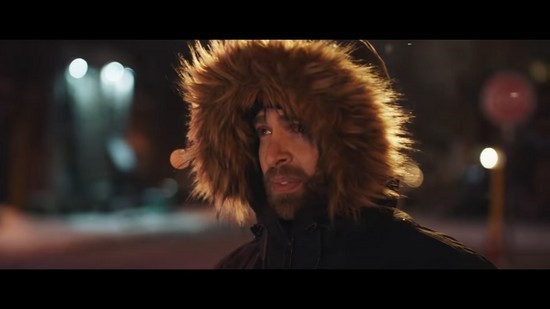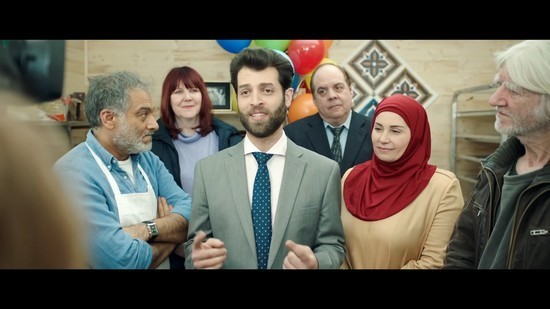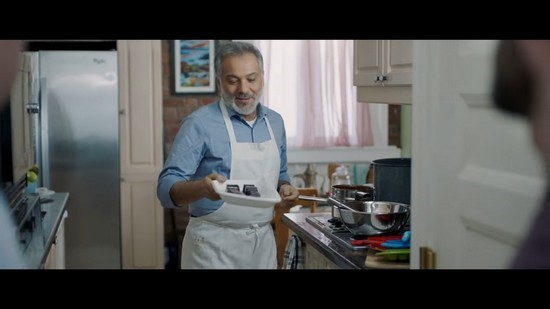Peace by Chocolate is the
film that will air first at the third edition of
Amman International Film Festival-Awal Film, which starts today. It is also the debut feature film of
Jonathan Keijser, who is co-writing the screenplay.
اضافة اعلان
Tareq Hadhad (Ayham
Abou Ammar) is one of the Syrian refugees welcomed by the Canadian government
in 2016. The young man, who dreams of becoming a doctor, finds himself in the
small town of Antigonish, Nova Scotia. There, in the midst of just over 4,000
inhabitants, he slowly acclimates. Then, his parents, Issam (Hatem Ali, since
deceased) and Shahnaz (Yara Sabri), come to join him; they are still waiting
for his sister (Najlaa Al-Khamri) and his brother-in-law, who will be killed
before being able to cross the Atlantic.

Issam, who does not
speak English, is idle. Walking through the streets of the small town, he opens
the door of a chocolate shop and meets the owner, Kelly (Alika Autran), to whom
he clumsily tries to give some sweets. It is because the Hadhads were famous
chocolate makers in Damascus before the war destroyed their company. The
patriarch, therefore, returns to the kitchen and gives Frank (Mark Camacho),
the resident who sponsored the family, a taste of his chocolates.
The sweets are
excellent and Frank sees them as a way for the family to earn a living. The
community mobilizes, offers the family a place to set up a small factory, and
lends them money to start the business. Peace by Chocolate quickly acquires an
international reputation (and is today a flourishing company).

In order to avoid
pontificating, Peace by Chocolate, is oriented from the beginning toward
comedy; it illustrates in a humorous way many of the difficulties newcomers
have to adapt to, such as winter, employment, language, etc. And with its
central themes of mutual aid, solidarity, and family, the film unquestionably
ticks all the right boxes, thus providing charming entertainment.
The hostility of the
Canadian winter
The beginning of the film suggests the opposite of what its title
announces — it is neither peaceful nor sweet, but hostile and bitter. The film
opens with a close-up of Tareq’s face surrounded by a thick toque and shivering
with cold, while an icy wind blows in the background. The uninviting Canadian
winter brings back traumatic memories of Tareq’s past — the bombing of
Damascus, his family fleeing to Lebanon, and having to leave everything behind,
like their home, the family factory, and for Tareq in particular, the prospect
of becoming a doctor. He may have received a second chance in Canada, but this
does not involve continuing his studies, since all the universities to which he
has applied have refused him.
The friendliness of
Canadians
Peaceful and sweet, by contrast, was the welcome he received from his
Canadian sponsors, Frank and his wife, upon his arrival at Halifax airport.
Tareq, the adult, sees himself taken in the arms of the smiling wife who puts a
scarf and cap on him with the inscription “Canada”.

“Is it that cold?” is
the first sentence of the newcomer. However, the weather and frustration at the
forced cessation of his studies, will be compensated by the immense kindness of
the people in this country. From small people like Frank greeting him with
kindness, to the head of the government, holding a speech in favor of welcoming
Syrian refugees. The first scene Tareq sees when he turns on the TV in his new
home, is Trudeau’s advocacy for his family’s plight.
The optimistic
attitude is also seen in Skype conversations between the eldest and his family,
still in
Lebanon. Instead of lamenting the dismal situation in their homeland,
the family behaves like curious tourists full of clichés about Canada, asking
him lots of questions about the Canadian winter and Canadians’ favorite
ingredient: maple syrup.
Personal happiness
versus family happiness
The humor from the very beginning of the film continues with the arrival
of the rest of the Hadhad family. However, the arrival highlights the personal
conflict of Tareq, who sees himself torn between his own dream of becoming a
doctor — he is offered a place of study, but at the other end of the continent
— and the responsibility to help his parents who, do not speak a word of
English.

“Son, without you I’m
illiterate”, says Issam in Arabic. Thus, confirming how much he depends on his
multilingual son in this new country, especially when it comes to restarting
the manufacturing of chocolate, which is the big dream of the father. A man who
starts snooping (in a very funny way) in the chocolate factory in Antigonish to
reach his goal. And the experience of the patriarch does not go unnoticed.
Supported by Frank, enthusiastic about homemade Canadian-Syrian chocolate,
Issam can sell his sweets to the local church — and the success is enormous. As
he himself sees it, “you’d think Canadians just discovered chocolate for the
first time”.
Thanks to community
crowdfunding, a small cabin equipped with basic professional equipment is built
in the family’s garden and orders are increasing. Tareq, who is responsible for
customer communication, among other things, and who in speeches across Canada
talks about his family’s inspiring experience, that of the “new Canadian
dream”, must soon decide whether to fulfill his dream or continue to support
the family business.
Show a positive story — and model refugees
Jonathan Keijser, director of Peace by Chocolate, heard the Hadhad
family’s success story on the news in Nova Scotia, where he himself grew up.
Fascinated, and convinced that the world needs a positive and inspiring story
about immigrants, the filmmaker got the idea of making a fictional film and
contacted the Hadhad family, who were immediately on board. Indeed, Keijser’s
film was not the first adaptation of their story, the film having been preceded
by the eponymous book by journalist Jon Tattrie.

In an effort to
ensure as much authenticity as possible, Keijser sought out actors who speak
Arabic with the correct Syrian accent so that an informed audience would
recognize the family members as being from their region.
Read more Reviews
Jordan News









